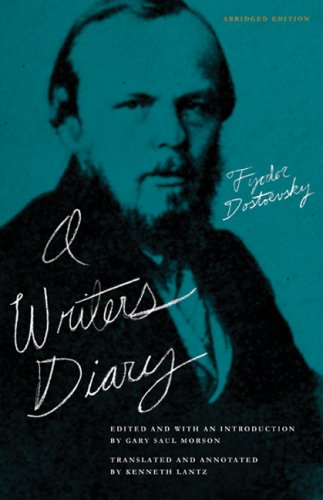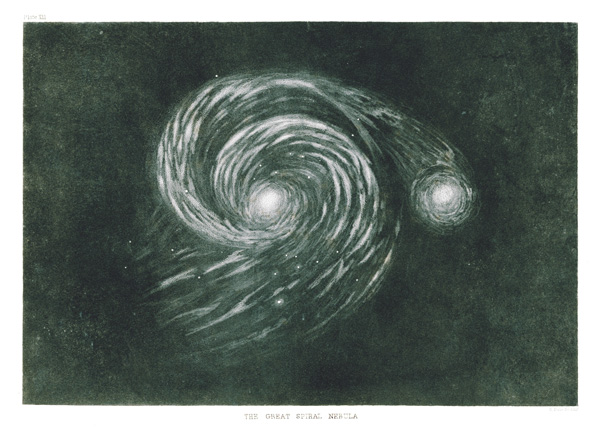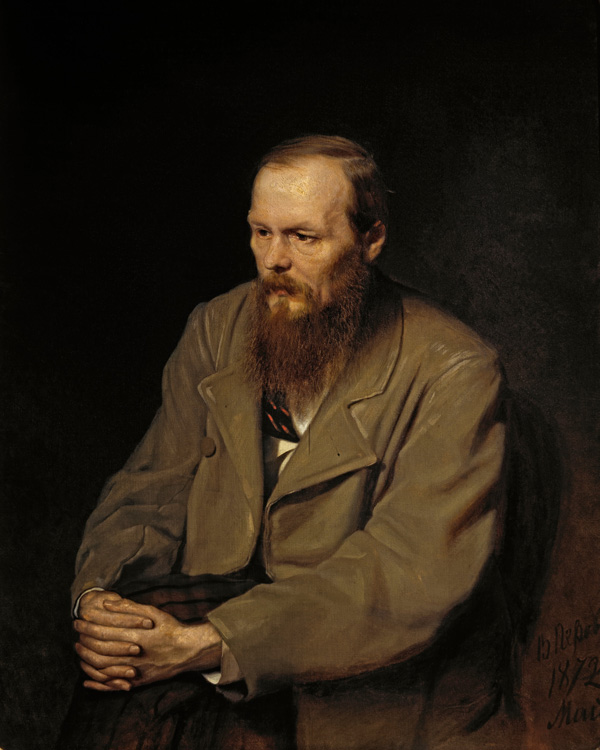----
The Day Dostoyevsky Discovered the Meaning of Life in a Dream
// Brain Pickings
"And it is so simple… You will instantly find how to live."
 One November night in the 1870s, legendary Russian writer Fyodor Dostoyevsky (November 11, 1821–February 9, 1881) discovered the meaning of life in a dream — or, at least, the protagonist in his final short story did. The piece, which first appeared in the altogether revelatory A Writer's Diary (public library) under the title "The Dream of a Queer Fellow" and was later published separately as The Dream of a Ridiculous Man, explores themes similar to those in Dostoyevsky's 1864 novel Notes from the Underground, considered the first true existential novel. True to Stephen King's assertion that "good fiction is the truth inside the lie," the story sheds light on Dostoyevsky's personal spiritual and philosophical bents with extraordinary clarity — perhaps more so than any of his other published works. The contemplation at its heart falls somewhere between Tolstoy's tussle with the meaning of life and Philip K. Dick's hallucinatory exegesis.
One November night in the 1870s, legendary Russian writer Fyodor Dostoyevsky (November 11, 1821–February 9, 1881) discovered the meaning of life in a dream — or, at least, the protagonist in his final short story did. The piece, which first appeared in the altogether revelatory A Writer's Diary (public library) under the title "The Dream of a Queer Fellow" and was later published separately as The Dream of a Ridiculous Man, explores themes similar to those in Dostoyevsky's 1864 novel Notes from the Underground, considered the first true existential novel. True to Stephen King's assertion that "good fiction is the truth inside the lie," the story sheds light on Dostoyevsky's personal spiritual and philosophical bents with extraordinary clarity — perhaps more so than any of his other published works. The contemplation at its heart falls somewhere between Tolstoy's tussle with the meaning of life and Philip K. Dick's hallucinatory exegesis.
The story begins with the narrator wandering the streets of St. Petersburg on "a gloomy night, the gloomiest night you can conceive," dwelling on how others have ridiculed him all his life and slipping into nihilism with the "terrible anguish" of believing that nothing matters. He peers into the glum sky, gazes at a lone little star, and contemplates suicide; two months earlier, despite his destitution, he had bought an "excellent revolver" with the same intention, but the gun had remained in his drawer since. Suddenly, as he is staring at the star, a little girl of about eight, wearing ragged clothes and clearly in distress, grabs him by the arm and inarticulately begs his help. But the protagonist, disenchanted with life, shoos her away and returns to the squalid room he shares with a drunken old captain, furnished with "a sofa covered in American cloth, a table with some books, two chairs and an easy-chair, old, incredibly old, but still an easy-chair."
As he sinks into the easy-chair to think about ending his life, he finds himself haunted by the image of the little girl, leading him to question his nihilistic disposition. Dostoyevsky writes:
I knew for certain that I would shoot myself that night, but how long I would sit by the table — that I did not know. I should certainly have shot myself, but for that little girl.
You see: though it was all the same to me, I felt pain, for instance. If any one were to strike me, I should feel pain. Exactly the same in the moral sense: if anything very pitiful happened, I would feel pity, just as I did before everything in life became all the same to me. I had felt pity just before: surely, I would have helped a child without fail. Why did I not help the little girl, then? It was because of an idea that came into my mind then. When she was pulling at me and calling to me, suddenly a question arose before me, which I could not answer. The question was an idle one; but it made me angry. I was angry because of my conclusion, that if I had already made up my mind that I would put an end to myself to-night, then now more than ever before everything in the world should be all the same to me. Why was it that I felt it was not all the same to me, and pitied the little girl? I remember I pitied her very much: so much that I felt a pain that was even strange and incredible in my situation…
It seemed clear that if I was a man and not a cipher yet, and until I was changed into a cipher, then I was alive and therefore could suffer, be angry and feel shame for my actions. Very well. But if I were to kill myself, for instance, in two hours from now, what is the girl to me, and what have I to do with shame or with anything on earth? I am going to be a cipher, an absolute zero. Could my consciousness that I would soon absolutely cease to exist, and that therefore nothing would exist, have not the least influence on my feeling of pity for the girl or on my sense of shame for the vileness I had committed?
From the moral, he veers into the existential:
It became clear to me that life and the world, as it were, depended upon me. I might even say that the world had existed for me alone. I should shoot myself, and then there would be no world at all, for me at least. Not to mention that perhaps there will really be nothing for any one after me, and the whole world, as soon as my consciousness is extinguished, will also be extinguished like a phantom, as part of my consciousness only, and be utterly abolished, since perhaps all this world and all these men are myself alone.
Beholding "these new, thronging questions," he plunges into a contemplation of what free will really means. In a passage that calls to mind John Cage's famous aphorism on the meaning of life — "No why. Just here." — and George Lucas's assertion that "life is beyond reason," Dostoyevsky suggests through his protagonist that what gives meaning to life is life itself:
One strange consideration suddenly presented itself to me. If I had previously lived on the moon or in Mars, and I had there been dishonored and disgraced so utterly that one can only imagine it sometimes in a dream or a nightmare, and if I afterwards found myself on earth and still preserved a consciousness of what I had done on the other planet, and if I knew besides that I would never by any chance return, then, if I were to look at the moon from the earth — would it be all the same to me or not? Would I feel any shame for my action or not? The questions were idle and useless, for the revolver was already lying before me, and I knew with all my being that this thing would happen for certain: but the questions excited me to rage. I could not die now, without having solved this first. In a word, that little girl saved me, for my questions made me postpone pulling the trigger.
Just as he ponders this, the protagonist slips into sleep in the easy-chair, but it's a sleep that has the quality of wakeful dreaming. In one of many wonderful semi-asides, Dostoyevsky peers at the eternal question of why we have dreams:
Dreams are extraordinarily strange. One thing appears with terrifying clarity, with the details finely set like jewels, while you leap over another, as though you did not notice it at all — space and time, for instance. It seems that dreams are the work not of mind but of desire, not of the head but of the heart… In a dream things quite incomprehensible come to pass. For instance, my brother died five years ago. Sometimes I see him in a dream: he takes part in my affairs, and we are very excited, while I, all the time my dream goes on, know and remember perfectly that my brother is dead and buried. Why am I not surprised that he, though dead, is still near me and busied about me? Why does my mind allow all that?
In this strange state, the protagonist dreams that he takes his revolver and points it at his heart — not his head, where he had originally intended to shoot himself. After waiting a second or two, his dream-self pulls the trigger quickly. Then something remarkable happens:
I felt no pain, but it seemed to me that with the report, everything in me was convulsed, and everything suddenly extinguished. It was terribly black all about me. I became as though blind and numb, and I lay on my back on something hard. I could see nothing, neither could I make any sound. People were walking and making a noise about me: the captain's bass voice, the landlady's screams… Suddenly there was a break. I am being carried in a closed coffin. I feel the coffin swinging and I think about that, and suddenly for the first time the idea strikes me that I am dead, quite dead. I know it and do not doubt it; I cannot see nor move, yet at the same time I feel and think. But I am soon reconciled to that, and as usual in a dream I accept the reality without a question.
Now I am being buried in the earth. Every one leaves me and I am alone, quite alone. I do not stir… I lay there and — strange to say — I expected nothing, accepting without question that a dead man has nothing to expect. But it was damp. I do not know how long passed — an hour, a few days, or many days. Suddenly, on my left eye which was closed, a drop of water fell, which had leaked through the top of the grave. In a minute fell another, then a third, and so on, every minute. Suddenly, deep indignation kindled in my heart and suddenly in my heart I felt physical pain. 'It's my wound,' I thought. 'It's where I shot myself. The bullet is there.' And all the while the water dripped straight on to my closed eye. Suddenly, I cried out, not with a voice, for I was motionless, but with all my being, to the arbiter of all that was being done to me.
"Whosoever thou art, if thou art, and if there exists a purpose more intelligent than the things which are now taking place, let it be present here also. But if thou dost take vengeance upon me for my foolish suicide, then know, by the indecency and absurdity of further existence, that no torture whatever that may befall me, can ever be compared to the contempt which I will silently feel, even through millions of years of martyrdom."
I cried out and was silent. Deep silence lasted a whole minute. One more drop even fell. But I knew and believed, infinitely and steadfastly, that in a moment everything would infallibly change. Suddenly, my grave opened. I do not know whether it had been uncovered and opened, but I was taken by some dark being unknown to me, and we found ourselves in space. Suddenly, I saw. It was deep night; never, never had such darkness been! We were borne through space and were already far from the earth. I asked nothing of him who led me. I was proud and waited. I assured myself that I was not afraid, and my heart melted with rapture at the thought that I was not afraid. I do not remember how long we rushed through space, and I cannot imagine it. It happened as always in a dream when you leap over space and time and the laws of life and mind, and you stop only there where your heart delights.

The 1845 depiction of a galaxy that inspired Van Gogh's 'The Starry Night,' from Michael Benson's 'Cosmigraphics.' Click image for more.
Through the thick darkness, he sees a star — the same little star he had seen before shooing the girl away. As the dream continues, the protagonist describes a sort of transcendence akin to what is experienced during psychedelic drug trips or in deep meditation states:
Suddenly a familiar yet most overwhelming emotion shook me through. I saw our sun. I knew that it could not be our sun, which had begotten our earth, and that we were an infinite distance away, but somehow all through me I recognized that it was exactly the same sun as ours, its copy and double. A sweet and moving delight echoed rapturously through my soul. The dear power of light, of that same light which had given me birth, touched my heart and revived it, and I felt life, the old life, for the first time since my death.
He finds himself in another world, Earthlike in every respect, except "everything seemed to be bright with holiday, with a great and sacred triumph, finally achieved" — a world populated by "children of the sun," happy people whose eyes "shone with a bright radiance" and whose faces "gleamed with wisdom, and with a certain consciousness, consummated in tranquility." The protagonist exclaims:
Oh, instantly, at the first glimpse of their faces I understood everything, everything!
Conceding that "it was only a dream," he nonetheless asserts that "the sensation of the love of those beautiful and innocent people" was very much real and something he carried into wakeful life on Earth. Awaking in his easy-chair at dawn, he exclaims anew with rekindled gratitude for life:
Oh, now — life, life! I lifted my hands and called upon the eternal truth, not called, but wept. Rapture, ineffable rapture exalted all my being. Yes, to live…
Dostoyevsky concludes with his protagonist's reflection on the shared essence of life, our common conquest of happiness and kindness:
All are tending to one and the same goal, at least all aspire to the same goal, from the wise man to the lowest murderer, but only by different ways. It is an old truth, but there is this new in it: I cannot go far astray. I saw the truth. I saw and know that men could be beautiful and happy, without losing the capacity to live upon the earth. I will not, I cannot believe that evil is the normal condition of men… I saw the truth, I did not invent it with my mind. I saw, saw, and her living image filled my soul for ever. I saw her in such consummate perfection that I cannot possibly believe that she was not among men. How can I then go astray? … The living image of what I saw will be with me always, and will correct and guide me always. Oh, I am strong and fresh, I can go on, go on, even for a thousand years.
[...]
And it is so simple… The one thing is — love thy neighbor as thyself — that is the one thing. That is all, nothing else is needed. You will instantly find how to live.
A century later, Jack Kerouac would echo this in his own magnificent meditation on kindness and the "Golden Eternity."
A Writer's Diary is a beautiful read in its entirety. Complement it with Tolstoy on finding meaning in a meaningless world and Margaret Mead's dreamed epiphany about why life is like blue jelly.
Donating = Loving
Bringing you (ad-free) Brain Pickings takes hundreds of hours each month. If you find any joy and stimulation here, please consider becoming a Supporting Member with a recurring monthly donation of your choosing, between a cup of tea and a good dinner.
You can also become a one-time patron with a single donation in any amount.
 Brain Pickings has a free weekly newsletter. It comes out on Sundays and offers the week's best articles. Here's what to expect. Like? Sign up.
Brain Pickings has a free weekly newsletter. It comes out on Sundays and offers the week's best articles. Here's what to expect. Like? Sign up.
Brain Pickings takes 450+ hours a month to curate and edit across the different platforms, and remains banner-free. If it brings you any joy and inspiration, please consider a modest donation – it lets me know I'm doing something right.
----
Shared via my feedly reader
Sent from my iPad

No comments:
Post a Comment